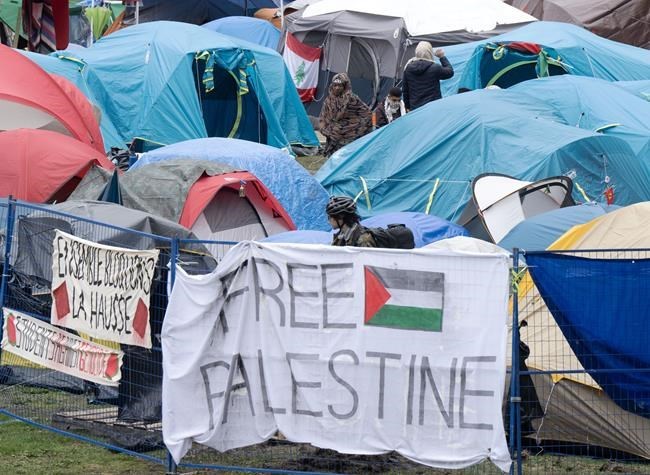A patchwork of colourful tarps covered dozens of tents at a pro-Palestinian encampment at McGill University's downtown campus on Sunday, shielding protesters from both the heavy rain and prying eyes.
More than a week after the first Canadian pro-Palestinian campus encampment began in Montreal, organizers at both McGill and the University of Toronto said they've become better prepared for the days to follow, thanks to donated materials and community support.
Protester Ari Nahman said Sunday that the Montreal encampment has become a "tiny city" complete with dozens of rainproofed tents, a library, a stockpile of donated supplies and makeshift wooden sidewalks to keep the mud at bay.
Nahman, a student at nearby Concordia University, said morale is high at the camp, despite several days of rain that have turned McGill's lower field into a slippery mess at times.
"I think we’re much more equipped and prepared today for the various weathers that exist," said Nahman. "We’re positive, the morale is good."
On Sunday, encampment members could be seen digging a shallow trench to drain away the heavy rain, as others staffed a tent operating as a "free store" serving up hot coffee, food and rain gear.
Nahman said that as of Sunday morning, the encampment has received a large number of donations including power banks, arts and crafts supplies, blankets, tents, tarps, ponchos, pallets, and "so much food."
While a sign on the metal encampment fence puts out a call for more trash cans, whiteboards and transparent storage containers, Nahman said the campers have been able to pass on some extra donated goods to local shelters.
Pro-Palestinian activists have also set up tents at the University of Toronto, the University of Ottawa and the University of British Columbia campus in Vancouver, following a wave of similar protests at campuses in the United States in response to the Israel-Hamas war. Students at the University of Manitoba have said they're planning an encampment this week.
Both McGill and Quebec Premier François Legault have described the Montreal encampment as illegal, and asked police to help dismantle the tents -- though as of Sunday the force had not complied with the request. Opponents of the camp, including counter-protesters who showed up Thursday, have said it makes some Jewish students feel unsafe.
The University of Toronto has said the tents, banners and flags at the encampment on its grounds are a safety concern, and has expressed concern over about reports of threats, discriminatory language and hate speech.
On Sunday, dozens of counter-protesters from the Jewish Defence League gathered near the Toronto encampment, waving Israeli flags. A few university campus special constables stood between the two groups as a line of control to ensure a peaceful protest.
Mohammad Yassin, a University of Toronto student and one of the encampment's spokespeople, said allegations that the protesters were being hateful or violent were "contrary to reality."
"People are walking around with their pets and their children," he said. "There are people drawing art and reading books and sitting down in prayer circles, and that’s exactly what the space is supposed to be."
Yassin said the protesters have everything they need to continue their encampment, including food, water, toilets, a library and a medical tent staffed with trained personnel. There are also community and prayer spaces and a "care tent" to offer quiet time or support for people with mental health concerns. Members of the local community have stepped up to offer three meals a day.
"We’re planning for longevity," he said. "We understand this is going to be a long struggle. The university is not going to hear our demands if we’re here for one day and then disappear."
Encampment protesters are demanding that their institutions disclose all investments and divest funds from companies protesters say are supporting Israel's actions against Palestinians. They also want the schools to cut ties with Israeli institutions.
Nahman, a member of Independent Jewish Voices Concordia, said the McGill protesters are carefully watching what's happening in the United States, where some protesters have struck deals with their schools and others have been met with police action.
The Associated Press has tallied about 2,500 people arrested at about 50 campuses since April 18, based on its reporting and statements from universities and law enforcement.
Last week, McGill offered to hold a forum to discuss the protesters' demands if the tents were dismantled "immediately." On Sunday, the school said it was working "diligently and in good faith with all interested parties."
Nahman, who is a member of Independent Jewish Voices Concordia, said the Montreal campers would like nothing better than to pack up their tents.
"We are willing to leave once we see divestment -- not a promise of a discussion of divestment, not a vote in a few months for divestment," Nahman said.
This report by The Canadian Press was first published May 5, 2024.
-- With files from The Associated Press
Morgan Lowrie and Ritika Dubey, The Canadian Press




